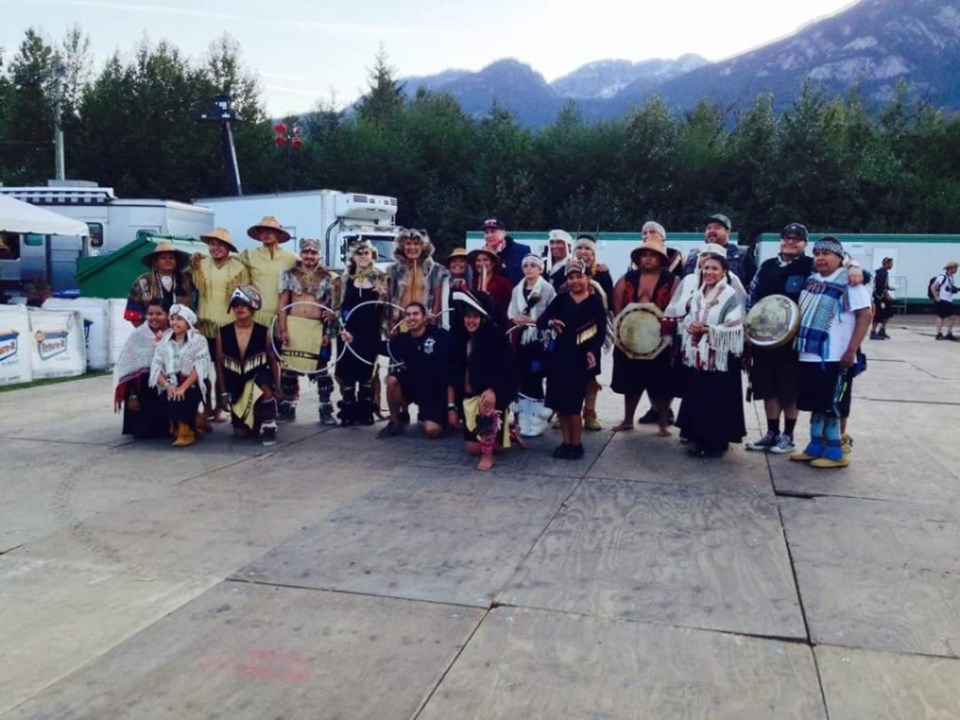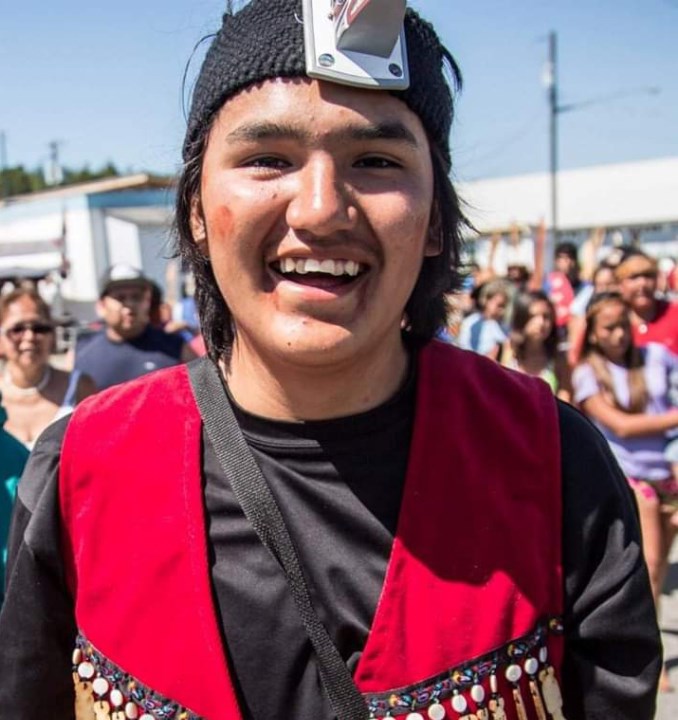Jonny Williams is following in his family's powerful footsteps. Williams is the son of Squamish Nation's culture and language worker Charlene Williams and grandson of prominent elder Linda Williams.
Williams, 21, is finishing up his final year in the Squamish Language Immersion Program at SFU.
The program began in 2016 as a partnership between the non-profit Kwi Awt Stelmexw — founded by Nation spokesperson Coun. Khelsilem — and SFU's First Nations Languages Centre and Department of Linguistics.
As the number of original Squamish language speakers dwindled to seven, the goal was to produce 157 speakers by 2027.
Williams is helping with that goal.
He has always been involved with his culture and has often been seen publicly dancing or drumming.
The Squamish Chief caught up with Williams for a chat about his motivation, goals and growing up in Squamish.
What follows is an edited version of that conversation.
Q: How have you enjoyed the SFU language immersion program?
A: It is actually really fun. I will be done by the end of next semester and they are talking about a master's program too, which would be cool.
Q: What do you want to do when you graduate?
A: It sounds a little selfish, but this education is really more for me. I just wanted to learn more about my culture. I thought that taking my language would be a great opportunity. I haven't decided if I want to be a teacher of it. The thing I have always thought about is it is something I will be able to learn and then I will be able to teach my kids.
Q: You did some work with the environmental organization Tides Canada, correct?
A: Yes, I did an internship for eight months with Nolan Rudkowsky, another Squamish Nation youth.
It was really interesting to work for a non-profit. We got to do research on Howe Sound. They want to get the different groups involved with Howe Sound talking. So people can communicate and make decisions together.
We also went to a plant workshop to learn about the medicinal uses of plants.
Then we got to do a shoreline clean up on the Defence Islands. The Squamish name is Kwum Kwum.
[On April 22, 1982 the government of Canada formally established the islands (15.4 acres) as a reserve of the Squamish Nation.]
Our people used to go to the lookout point and if they saw a raid approaching they would go and tell the rest of the community. It is a pretty sacred spot.
We wanted to do a clean up there because trespassers and squatters go there and so there was a lot of garbage. Once a squatter was even stealing the wood meant for a longhouse.
We did a clean up with youth to help and show them that we can make a difference.
We found a bunch of glass, cigarette butts, metal, Styrofoam — we found one big oil barrel that was rusted out, that was weird.
Q: You are known as an engaged youth and a cultural leader. Did you grow up learning Squamish Nation traditions and protocols?
A: Yes. Something that my family says is that I was a "community kid." What that means is that I was — it sounds funny saying this — groomed to be a speaker. Meaning, I was groomed to be able to talk in front of people at ceremonies and that kind of thing. From a young age, I have been culturally involved. I started participating in a traditional dance group at about three years old. I was practising before that, because my family has run the dance group Welh Tima Kexwusem, meaning "culture bringing people together," for some time now.

Q: Was being out in front of people part of your personality or were you shy and learned to be OK with it?
A: My family says I have always been outgoing. As I got older I got a bit shyer. They put me in front of people ever since I was a little kid. I still get nervous, but mostly when I am speaking my Squamish language in front of a lot of people, because English was my first language.
Q: How was living in the district of Squamish when you were growing up?
A: Personally, I didn't experience a lot of racism. I went to [the former] Stawamus Elementary School, and most of the kids there were Indigenous.
A lot of people called it the "bad school" because a lot of Natives went there, but you just deal with it.
In middle school and high school, I did a lot of sports and would perform in front of the school for cultural days.
It is hard to do that, not everybody can.
Q: As you have grown up, the Squamish Nation has taken a more front-and-centre-role in terms of development and First Nations have been more respected at the provincial and federal government level. What do you see for the future?
A: With B.C. just accepting the United Nations Declaration on the Rights of Indigenous Peoples (UNDRIP) and all the treaty negotiations going on — Squamish Nation is proposing high-rises, there is going to have to be good teamwork between the Squamish Nation and the people of Squamish, as there has always been, because we are always going to be together.
In terms of the schools, the district has been really endorsing First Nation teachings, with Sea to Sky Learning Connections where there is Aya7ayulh Chet (Cultural Journeys) and Learning Expeditions. That is a pretty huge move forward for the Squamish people because they have a school where they can practise their traditions and be able to teach people their culture. We had it a bit before, but it was bits and pieces. For children to be able to sit down and have time to talk in talking circles, it might help them calm down. One of my favourite quotes is from Lisa McCullough [school district 48 local superintendent]. She says, "if it is good for Indigenous kids, it is good for all kids." I always remember that.
Q: Looking back, what would your advice be for little boys, like you were, in Squamish now?
A: I would recommend, even if it is just a little bit, is to practise your culture. A lot of the time, when Indigenous kids don't, they have a piece missing from them, it seems like. And even if not, it is grounding and brings you into your community. The next thing would be to always keep looking forward and work on you. Don't worry too much about what people say about you.
Q: What is next for you?
A: I want to finish my schooling. Eventually, I would like to be on Squamish Nation council and help make some decisions, but that is a long-term goal.




